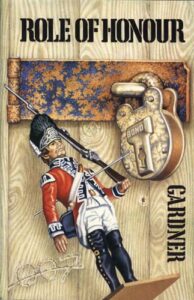Bond. James Bond. Is there a name more synonymous with spying, tuxedos, and shaken cocktails than the British secret agent? Join me as I read all of the James Bond books in 007 Case Files, encompassing Ian Fleming and beyond. For Your Eyes Only: there’s spoilers ahead.
Bond working for SPECTRE? Say it isn’t so!
If there was one thing that I knew my pandemic brain could handle right now, it was a bit of the ol’ sexist, misogynist dinosaur we know and love as James Bond. Following the excellent hijinks of Icebreaker, John Gardner’s fourth outing with 007 might be a technological relic of the Cold War, but it’s an otherwise modern thriller with a no-frills attitude.
Released in 1984, ROLE OF HONOUR sees Bond ousted from the Secret Service for what feels like the umpteenth time. Here it’s because accusations of impropriety from a large inheritance (from Australia, no less) disgust Bond, so he stumps out without even getting the chance to spill a bit of Martini-flavoured flirtatious harassment on Moneypenny.
Naturally, the whole thing is to sell the idea of a rogue 00 agent up for grabs, and eventually get Bond on the inside of some criminal organisations. After spending a whole month learning about computers, Bond raises interest in SPECTRE and Jay Autem Holy, a former enemy agent who is now using computer simulations to win real battles.
“In a year or so, the little home micro will be able to store almost as much information as the large mainframe computers used by banks and government departments.”
Ah, yes: the computer age. If there was a more persistent trope in the mid-80s it was the idea that computers were the next nuclear threat. Only a year earlier, director John Badham released the Matthew Broderick vehicle WarGames (1983), popularising the idea of World War III could be started by someone who was really into playing Risk IRL.
Yet in Gardner’s hands, ones that (after a critically rocky start) had now become very comfortable with a version of the character, ROLE OF HONOUR is a surprisingly grounded adventure. Indeed, it telegraphs the Timothy Dalton film era by a few years. While the villain may mirror Max Zorin from A View to A Kill, some of the plot elements – specifically, the giant games room and Bond’s resignation – wound up in movies The Living Daylights and Licence to Kill respectively.
Speaking of filmic influences, at least one chapter was replaced at the last minute thanks to its similarities with the non-Eon film Never Say Never Again (1983). An elaborate Waterloo role-playing sequence was reportedly removed, with Gardner commenting that “I thought I had gotten the modern equivalent of the famous golf game [from Goldfinger], or the bridge game with Drax [in Moonraker].” Even the folks at Bentley got in on the action, requesting that Gardner not pimp Bond’s ride with anything more than a phone.
“I wanted my country strong again, by putting Russia and the U.S.A. on the same footing.”
Despite these restrictions, or perhaps because of them, there’s a lot to like about this low-key Bond. There’s no delusions that a couple of keystrokes can change the world, and Bond’s lack of hacktivity is spotted a mile off. For the most part, this is a very straightforward story of a spy with nothing but a gun and his wits who has been cut off from his organisation. Even the villain’s goal is a misguided attempt at peace by unseating both the US and Russia’s nuclear dominance.
Perhaps my favourite moments in the book arrive in the final chapters, when Bond’s single-serve love interest has a poignant revelation. Attacked while in a post-coital embrace, the alliteratively named Persephone ‘Percy’ Proud acknowledges a painful truth: “We’re not like other people, are we? We’re trained, and tidied, and obey orders – fly into danger at a moment’s notice.” While Bond’s response is fairly nonchalant, perhaps you will also feel the weight of Vesper Lynd and Teresa ‘Tracy’ Bond when Bond replies, “What you mean is that people like us can’t just stop, or lead normal lives.”
At the time, Gardner felt that this was the “weakest so far,” partly due to his own illness and lack of a break between volumes. If anything, the final coda means the entire book can probably be read as a prelude to the return of a new leader for SPECTRE in Tamil Rahani. You may also take issue with the perfunctory way in which women, henchmen, and mild racial slurs are used, abused and dispatched without ceremony. In other words, it’s Gardner channelling the spirit of Ian Fleming.
James Bond will return…in Nobody Lives for Ever.





